Conference Co-Chairs
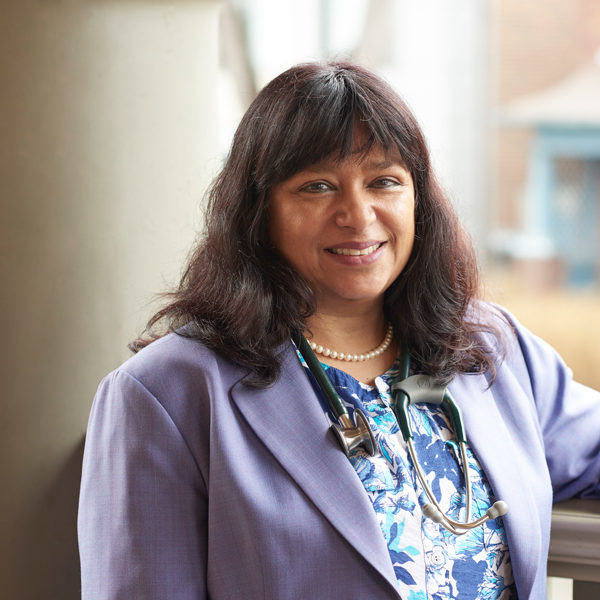
Anna Banerji O.Ont. MD MPH FRCPC DTM&H CTropMed
CPD Conference Chair, Indigenous and Refugee Health
Associate Professor
Pediatrics and Dalla Lana School of Public Health
Temerty Faculty of Medicine, University of Toronto
Dr Anna Banerji is an associate professor in pediatrics and at the Dalla Lana School of Public Health and is a pediatric infectious and tropical disease specialist. She graduated from medical school at U of T and trained at Ottawa University (pediatrics), McGill University (infectious disease and tropical medicine). She received an MPH in International Health from Harvard School of Public Health where she was selected “promising graduate” for the class of 2003.
In 2014 Dr. Banerji created the inaugural Indigenous Health Conference which she continues to co-chair. She has travelled to numerous Indigenous communities across Canada in various capacities and has been to the Arctic over 50 times. Her research on lower respiratory infections in Inuit children has spanned over 25 years and has resulted in changes to the national guidelines for the prevention of RSV. Recently Dr. Banerji has been successful in advocating for more resources for Indigenous communities to fight COVID-19 through petitions.
Dr. Banerji has been working with refugees for most of her career. She founded the Canadian Refugee Health Conference in 2009 and is the co-founder of the North American Refugee Health Conference (NARHC) which she chairs in alternative years in Toronto. She is also the co-founder and president of the North American Society of Refugee Healthcare Providers. In 2014 she created the COSTI Pediatric Clinic where she screens most of the government assisted refugee (GARS) children coming to Toronto. In 2016 she set up a clinic at a hotel in response to the mass resettlement of Syrian refugees and screened over 700 Syrian refugee children.
Dr. Banerji has travelled extensively around the world including work in Haiti after the earthquake with the Canadian Red Cross. She uses a human rights framework for her work, research and education and is an advocate for both Indigenous and refugee populations. She has given hundreds of media interviews mostly advocating for health equity. She has won several awards including the Order of Ontario in 2012, and in 2019 she was the recipient of the Dr. Peter Henderson Bryce Award for her advocacy with Indigenous children.
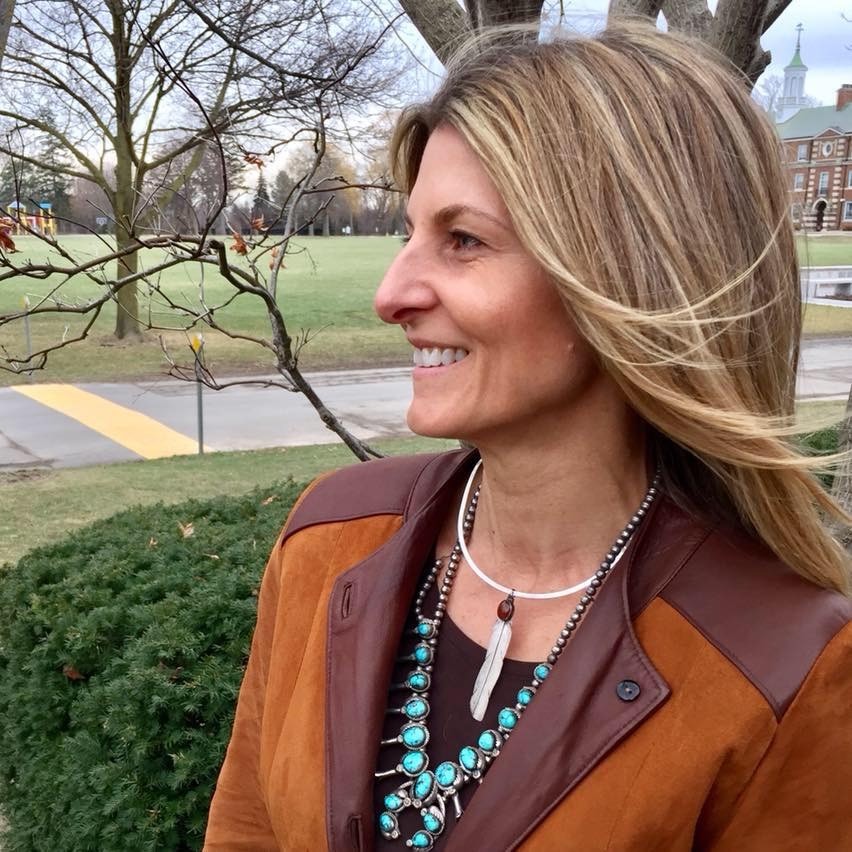
Michele-Elise Burnett
Métis-Algonquin
President, Kakekalanicks
Associate Director, Landscape of Nations 360° Indigenous Education Platform
Artistic Director, Celebration of Nations Gathering & Strawberry Moon Festival
Director, Moccasin Talks Speaker Series
Michele-Elise Burnett, Métis with Algonquin roots, Bear Clan, is President of Kakekalanicks, an Indigenous arts and consultancy company which helps promote and educate Indigenous art and artists to a broad audience. Ms. Burnett is the Native Artistic Producer of Artpark’s Annual Strawberry Moon Festival and the Native American Peace Garden and serves as the Artistic Director of the Annual Celebration of Nations, both Indigenous gathering, provides a far-reaching platform for the community to embrace and honour the unique heritage, diverse cultures, and outstanding achievements of Indigenous peoples through the arts ; Associate Director of Landscape of Nations 360°, a unique national Indigenous education initiative which provides guidance to teachers and programmers in the Niagara Region and beyond; LON 360° is the Indigenous Experience lead for the Niagara Parks Commission, developing year round Indigenous events and tours and co-advancement director and inaugural unveiling producer for Landscape of Nations: The Six Nations & Native Allies Commemorative Memorial, at Queenston Heights and is currently the Co-Chair of the Indigenous Health Conference. In 2018, she was the recipient of the Culture Arts Award from the GNCC Women in Niagara for her success and contributions to the community and in 2020 was recognized as one of Welland Historical Muesum’s Notable People virtual tour. Ms. Burnett sits on the Board of Trustees at Brock University where she also is Co-Chair of the Aboriginal Education Council. She also serves as a Board member of the Ridley College Fund USA and on the Niagara 2021 Canada Summer Games Board member and chair of the Indigenous Partnership Council to the Games. Ms. Burnett started her career in the radio industry. After graduating from Ryerson University’s School of Radio and Television Arts, she became a third-generation radio business owner in an industry pioneered by her father and grandfather. Later, partnering with her mother, she owned and operated the most powerful signal in the Niagara Region, Spirit 91.7 FM Radio. The accomplished mother/daughter team were the first Indigenous people to be granted two private broadcasting licenses in Canada. Fiercely proud of her heritage, Ms. Burnett has shown that an individual who is inspired that we can wake up every day and follow and achieve their dreams. A strong proponent of Indigenous aspirations, she fosters a dream to unite, share, and respect each other’s Nations and to build a stronger Indigenous future filled with pride, dignity, and honour that will carry on for seven generations.
Invited Speakers
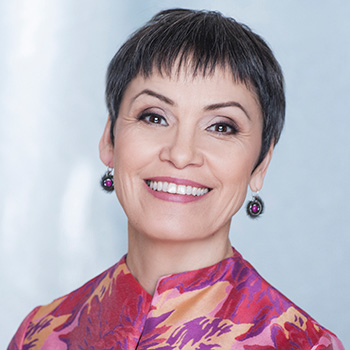
Susan Aglukark OC
Inuit Artist
Founder and chair of the Arctic Rose Foundation
Advisor on the Collateral Damage Project
Nunavut’s first ever Juno Award winning Inuk singer/songwriter, Susan calls herself the accidental artist. Susan grew up in Arviat, Nunavut and with “no musical orthodoxy” to draw from, Susan’s early years were spent learning as she was headlining.
Susan’s early writing (The Arctic Rose-1992) was a series of songs drawn from the thing she had left, a life of uncertainty. The past 25 years and the following 7 albums has seen Susan set on a path of personal discoveries, cultural reconnections and personal healing, a very different path than the one she imagined when she left her home. In her singing/songwriting career, Susan is most proud about reaching a place in her life where she knows she is right where she belongs, singing/songwriting and falling in love with creating.
Susan has garnered 3 Juno awards, received The Order of Canada in 2005 and most recently was awarded the Governor Generals Lifetime Artistic Achievement Award (June-2016).
Susan has performed for HRH Queen Elizabeth, Jean Chrétien, Brian Mulroney, Nelson Mandela, Billy Graham and The Countess Of Wessex.
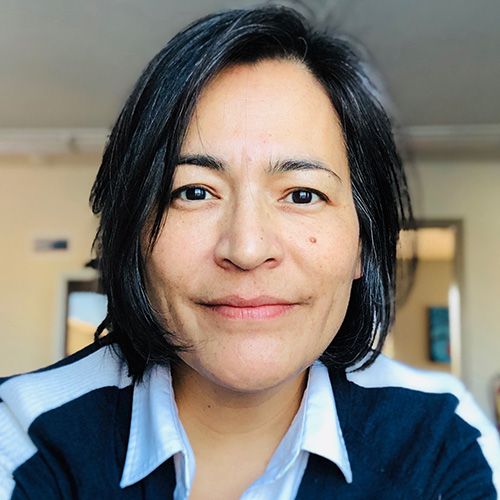
Michèle Audette
Commissioner
National Inquiry into Missing and Murdered Indigenous Women and Girls
Hailing from the Innu community of Mani Utenam, next to the town of Sept-Îles on the North shore of the St. Lawrence River, Michèle Audette followed in the footsteps of her mother, respected Innu activist Evelyne St-Onge. Working with Quebec Native Women Inc. since 1990, Audette was elected President of this organization in November 1998.
Endorsing her predecessors’ equal rights commitments, Audette was also a strong advocate of women’s positions on a number of issues such as Bill C-7 (which dealt with First Nations governance) on the division of matrimonial real property. She raised decision-makers awareness of the importance of women’s health, safe houses for Aboriginal women, youth issues and international development during her term in office. Thanks to her efforts, four new coordinator positions were created at QNW, which increased the organization’s influence and profile. The Quebec Commission des droits de la personne et des droits de la jeunesse (Commission of Human Rights and Youth Rights) recognized the many accomplishments of Quebec Native Women Inc. with an honourable mention in 2001.
Audette sat on a number of committees and boards of directors and served as acting president of the Native Women’s Association of Canada in 2001. She won a number of awards and distinctions for her work on social issues, including the Quebec YWCA’s Femme de mérite award in the Community involvement category in 2004. She was also one of Montreal daily La Presse’s personalities of the week in 2003. Audette’s mandate with Quebec Native Women Inc. ended in March 2004 when she was appointed Associate Deputy Minister responsible for the Status of Women Secretariat in the Government of Quebec.
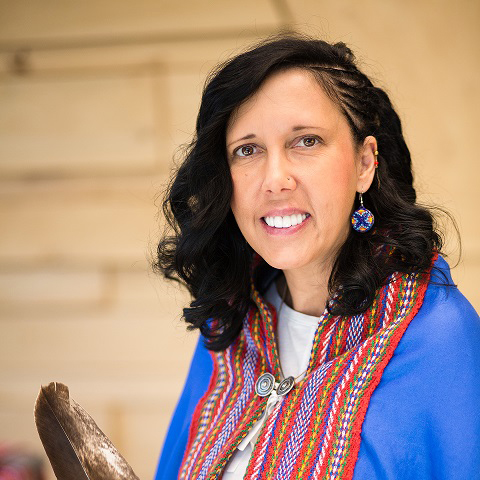
Carrie Bourassa BA MA PhD
Métis
Professor
College of Medicine
University of Saskatchewan
Scientific Director, Institute of Indigenous Peoples’ Health
Canadian Institutes of Health Research
Dr. Carrie Bourassa BA MA PhD is a Professor, Community Health & Epidemiology, College of Medicine, University of Saskatchewan and the Scientific Director, Institute of Indigenous Peoples’ Health – Canadian Institutes of Health Research (CIHR-IIPH). She is an adjunct in the Faculties of Education and Kinesiology & Health Studies at the University of Regina and is the Nominated Principal Investigator for the Canada Foundation for Innovation (CFI) funded Morning Star Lodge established in 2010, based in Regina, as well the recently CFI-funded Cultural Safety, Evaluation, Training and Research lab, hosted at the University of Saskatchewan.
Dr. Carrie Bourassa spent over 15 years as a professor of Indigenous health studies in the Department of Indigenous Health, Education and Social Work at the First Nations University of Canada (FNUniv) in Regina.
Through her role as Scientific Director of IIPH, she leads the advancement of a national health research agenda to improve and promote the health of First Nations, Inuit and Métis Peoples in Canada.
In 2012, Dr. Bourassa won the (Wee-e- chee-hee- way- shin-awn) Wiichihiwayshinawn Foundation Inc. Métis Award in Health and Science. Dr. Bourassa is Métis and belongs to the Riel Métis Council of Regina Inc. (RMCR, Local #34).
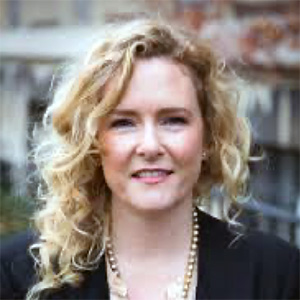
Allison Crawford MD PhD FRCPC
Associate Chief, Outreach, Telemental Health, and ECHO
Centre for Addiction and Mental Health
Associate Professor
Department of Psychiatry and Dalla Lana School of Public Health
University of Toronto
Allison Crawford is an Associate Professor in the Department of Psychiatry, University of Toronto, and has adjunct appointments in the Dalla Lana School of Public Health, and the Department of English at the University of Toronto. Dr. Crawford’s clinical and administrative work centers around her role as Associate Chief of Outreach and Telemental Health at CAMH, and as co-Chair of both ECHO Ontario, and ECHO Ontario Mental Health, a televideo-based education program. Much of her work also relates to Indigenous health, and she has extensive experience working in Inuit communities in Canada, and internationally through the Arctic Council. Her research is in the areas of: health equity; digital health; and patient- and community-oriented research. She also does research in suicide prevention and early childhood adversity. The primary research methodologies she employs are qualitative methods, including arts-based methods, visual methods, and Indigenous research methods. She is interested in theoretical approaches drawn from postcolonial theory, feminist science and technology studies, and new materialism. Dr. Crawford is involved in teaching medical and health professions students in the use of arts-based methods, including a course at the Art Gallery of Ontario. She is also Editor-in-Chief of the journal Ars Medica: A Journal of Medicine, the Arts and Humanities, and co-curator of The Body Electric, an international digital arts show sponsored by the Royal College of Physicians and Surgeons of Canada, cocurated with Dr. Lisa Richardson.
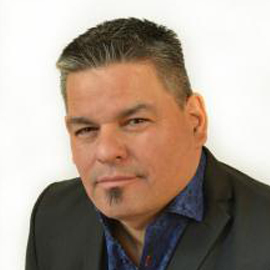
Isadore Day, Wiindawtegowini CEO
Bimaadzwin Inc.
Former AFN Health Portfolio
Isadore Day, Wiindawtegowinini, is an Anishinaabe from Serpent River First Nation. He is of the Genozhe ndodem (Northern Pike Clan). He brings many years of political and policy expertise. A former Regional Chief of Ontario, Lake Huron Region Grand Chief and Vice Chair of the North Shore Tribal Council, he has served 15 years as an elected leader for First Nations and has handled various high-level policy files. He is hereditary to Chief Shingwauk, Wiindawtegowinini and Genebek, who signed the Robinson-Huron Treaty and the Manitoulin Treaty and were allies to the British Crown in the War of 1812.
Chief Day has been involved in various boards and committees; at both regional and national levels over the past two decades while remaining a strong grassroots visionary. With a background in Social Sciences, Business, Public Administration and Governance – he is a firm believer that education that is culturally rooted and is bridged into mainstream disciplines is essential to success. His most noted accomplishment was repatriating First Nation children back to his First Nation from mainstream foster care systems. He has been an energy policy leader, community developer and a tireless advocate for First Nation treaty rights.
Isadore Day’s main focus is on Nationhood rights and Sovereignty; and specifically, the improvement in First Nation health, social, economy conditions of current and future generations. Isadore is emphatic that the Indian Act is colonial oppression and at the root of what must change in all First Nations – he vows to maintain and refine his life’s mission to be focused on reconstituting Indigenous Nations on Turtle Island.
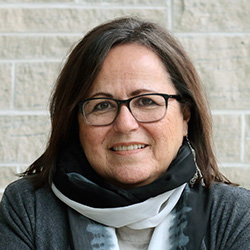
Bernice Downey
Assistant Professor, Indigenous Health Lead
Faculty of Health Science, McMaster University
Dr. Bernice Downey (She/Her) is a woman of Ojibwe and Celtic heritage, a mother and a grandmother. She is a medical anthropologist and is cross-appointed with the Department of Psychiatry and Neuro-Behavioural Sciences & the School of Nursing. She is also appointed as the Indigenous Health Lead for the Faculty of Health Sciences at McMaster. Her research interests include health literacy and Indigenous Traditional knowledge and health/research system reform for Indigenous populations. She holds a Heart & Stroke Foundation – Canadian Institute of Health Research – Chair in Indigenous Women’s Heart and Brain Health. Dr. Downey successfully led the development of the McMaster Indigenous Research Institute, of which she is the Acting Director. She is committed to addressing anti-Indigenous racism and the promotion of Indigenous self-determining approaches in system reform.
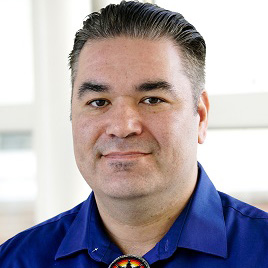
Rodney Haring PhD MSW
Beaver Clan, Seneca Nation
Director
Center for Indigenous Cancer Research
Roswell Park Comprehensive Cancer Center
Rodney C. Haring is research faculty at Roswell Park Comprehensive Cancer Center’s Office of Community Outreach and Engagement, Department of Cancer Prevention and Control. He is also a research professor at the Native American Research and Training Center, Family and Community Medicine, University of Arizona and held fellowships at the National Congress of American Indians and the Mayo Clinic. Dr. Haring (Beaver Clan) is an enrolled member of the Seneca Nation of Indians and resides on the Cattaraugus Indian Reservation (NY). He holds a doctoral degree in social work with over 15 years of social work practice and recently held an at-large appointment on the US Department of Health and Human Services American Indian/Alaska Native Health Research Advisory Council. He is also the lead delegate for the historic MoU between Rowell Park and Indian Health Services with the common mission of addressing health burdens in Indigenous communities. He served as an expert panel member to the United States Department of Education, the White House Office of National Drug Control Policy—Executive Office to the President. In 2017 he was awarded an Impact Award by the National Indian Health Board. His research interests intersect eliminating disparities and encouraging resiliencies within First Nations and Indigenous societies.
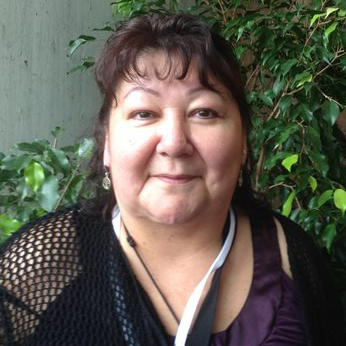
Karen Hill MD CCFP
Mohawk, Grand River First Nation
Lead Physician
Juddah’s Place
Karen Hill is a Mohawk physician from Six Nations of the Grand River Territory. She completed medical school in 2003 and Family Medicine Residency in 2005 – both from McMaster University. Karen’s vision is to see Traditional Indigenous Knowledge return to the centre of healthcare for Indigenous people across Canada. This vision led her to co-create a collaborative practice with Traditional Medicine Practitioners at Six Nations called “Juddah’s Place”. In 2015 she became the first recipient of the Thomas Dignan award for Indigenous Health conferred by the Royal College of Physicians and Surgeons. In the same year she also received The College of Family Physicians Excellence Award for leading the way in collaborative care in primary practice. Lastly in 2016 she was honored by McMaster University with a Community Impact Award. Karen continues to practice family medicine at Six Nations and Moose Factory. She has completed 4 years apprenticeship in Traditional Indigenous Medicine and continues this learning along with Mohawk language classes as lifelong commitments.
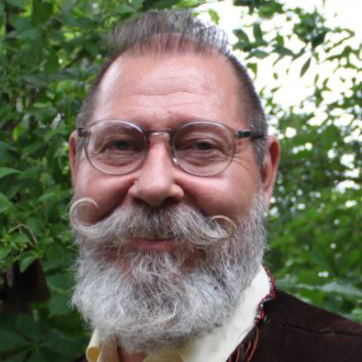
Brian Kon RRT-AC MBA
Métis
Indigenous Knowledge Carrier
President, Sterling Frazer Associates
Accessible Niagara
Brian Kon is a leader within the Métis Nation and within the local Indigenous Community. He is the Chair of Niagara Region Métis Council and sits on the Niagara Indigenous Community Advisory Board focused on reducing homelessness of Indigenous people. He is an ambassador for the Celebration of Nations, an annual Indigenous cultural celebration held in St Catharines. Brian was on the organizing committee for the Landscape of Nations – a tribute to the role Indigenous people played in the War of 1812. As a member of Landscape of Nations, Brian now is working with a dedicated team of educators, historians and community members who are re-writing the history of the War of 1812 through an Indigenous lens that will become part of school curriculum across the country. Brian’s interest in Indigenous education includes his participation in advisory committees for the Indigenous Partnership Council for the 2021 Canada Summer Games, Indigenous Education Management Circle (Niagara College), Aboriginal Education Council (Brock University) and he is the Indigenous Lead for Niagara Catholic District School Board.
As a visual artist, Brian’s art pays homage to his Cree/Métis ancestors through his paintings, which have been on display across Canada, including a current piece on extended display in Ontario’s legislature. Proud of what his art represents, Brian provides workshops in schools and throughout community as a way of telling the story of Métis people, but also to draw attention to important issues that face Indigenous people – Indian Residential Schools, Murdered and Missing Indigenous Women, and Two Spirited people.
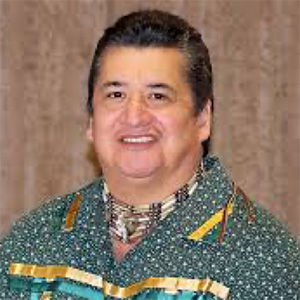
R. Stacey Laforme
Chief New Credit First Nation (MNCFN)
R. Stacey Laforme is the elected Chief of the Mississaugas of the New Credit First Nation (MNCFN). Born and raised on MNCFN, Chief Laforme has served his community for over 18 years, being first elected to council in 1999. As Chief of the MNCFN, he works to increase the profile, welfare and prosperity of the First Nation throughout the traditional 3.9 million acres of territory in Southern Ontario. He was instrumental in having the MNCFN be the first ever official First Nation host of the Pan Am/Parapan Am Games in 2015. He is a noted author of books and poetry, with his poem Remember engraved in the Veterans Memorial, and others featured in the short film Sacred Trust and at Fort York in Toronto. Chief Laforme is committed to preserving the land, history, language and culture of the MNCFN.
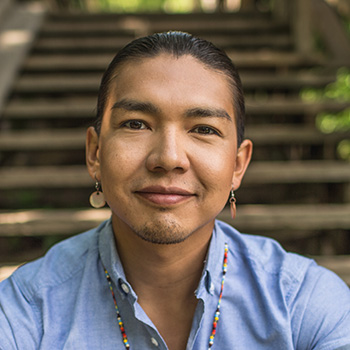
James Makokis BSc MHSc MD CCFP
Family Physician
Kinokamasihk Nehiyô Nation, South Common Medical Centre
Associate Clinical Professor – Faculty of Medicine, University of Alberta
Adjunct Lecturer – Dalla Lana School of Public Health, University of Toronto
Professor, Yellowhead Tribal College
Dr. James Makokis is from the Saddle Lake Cree Nation in Northern Alberta. He holds a Bachelor of Science in Nutrition and Food Sciences, a Master of Health Science in Community Nutrition and a Doctorate in Medicine. He received certification from the Aboriginal Family Medicine Training Program at the University of British Columbia. Currently, he works as the sole Family Physician at Kehewin Health Services on Kehewin Cree Nation. Dr. Makokis leads one of North America’s most progressive and successful transgender focused medical practices in south Edmonton. His strong connections to his cultural beliefs, nehiyaw maskihkiya, preventative health through the Cree medical system, spirituality, and Two-spirit perspective has helped him save lives within the LGBTQ2 and First Nation communities. Dr. Makokis participated alongside his husband as “Team Ahkameyimok” on Season 7 of The Amazing Race Canada and won. He was also recently announced as the inaugural Medical Director at Shkaabe Makwa, Centre for Addiction and Mental Health in Toronto.
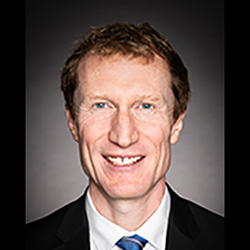
Hon. Marc Miller PC MP
Minister of Indigenous Services
The Honourable Marc Miller was first elected in 2015 as the Member of Parliament for Ville-Marie—Le Sud-Ouest—Île-des-Sœurs, in Montréal.
Before entering politics, Minister Miller was a practicing lawyer. He specialized in mergers and acquisitions, with a focus on international and commercial law, and worked in Montréal, Stockholm, and New York City. Previously, he served as an infantry soldier in the Canadian Armed Forces.
As a Member of Parliament, Minister Miller made history in 2017 when he delivered a statement in the House of Commons entirely in Mohawk, marking the first time the language had been spoken in either the House of Commons or Senate since Confederation. He has also been a forceful advocate for increased federal investment in affordable housing, public transit, and the Canada Child Benefit.
Minister Miller has been involved in several charitable and pro bono legal initiatives. He has also authored articles on constitutional and human rights law.
Minister Miller is a graduate of the Université de Montréal, where he earned a Master’s and Bachelor’s degree in Political Science. He also graduated from McGill University with degrees in Common Law and Civil Law.
Minister Miller was born and raised in Montréal.
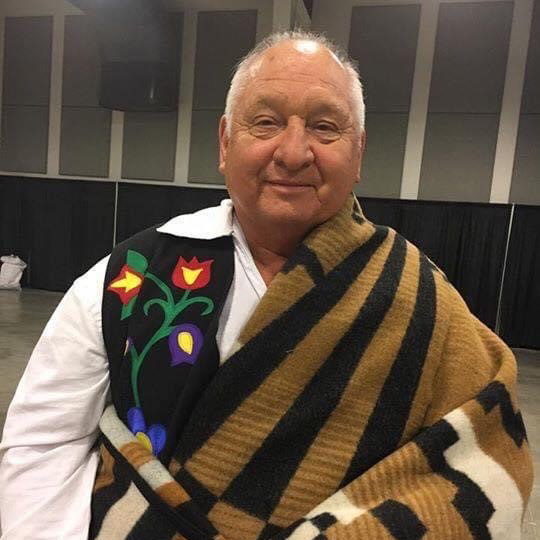
Tom Porter
Bear Clan Elder of the Mohawk Nation in Akwesasne
Founder Director and Spiritual Leader of the Traditional Mohawk Community of Kanatsioharè:ke
Thomas R. Porter (Sakokwenionkwas-“The One Who Wins”) has been the founder, spokesperson and spiritual leader of the Mohawk Community of Kanatsiohareke (Ga na jo ha lay gay) located in the Mohawk Valley near Fonda, New York since 1993. He is a member of the Bear Clan of the Mohawk Nation at Akwesasne. (Akwesasne, also known as the St. Regis Mohawk Reservation, straddles the New York State/Canadian border near Massena, New York.) He is married to Alice Joe Porter who is Choctaw, and has six children.
Mr. Porter; held the position of sub-chief for the Tehanakarine Chieftainship title, one of the nine chief titles of the Mohawk Nation, for 21 years (1971-1992). Chiefs are considered to be spiritual as well as political leaders. Some of the duties of that position were: officiating at marriage ceremonies, death ceremonies and numerous other traditional ceremonies held throughout the year.
He was the director of and, a teacher at the Akwesasne Freedom School and taught at the Kahnawake Survival School. He taught Mohawk language, philosophy and history at both schools as well as carpentry at Kahnawake. The purpose of both schools is to teach all of the usual subject matter, but within a traditional Mohawk worldview and with emphasis on keeping the Mohawk language alive and vital. It is said that with the loss of language, there also is the loss of at least 50% of a people’s culture and identity.
Mr. Porter worked as Secretary for the Mohawk Nation Council of Chiefs for 8 years and as interpreter for 11 years. He is still called on to help out as needed, when his schedule allows. Mr. Porter organized the “White Roots of Peace”, a traveling multi-media communications group designed to revitalize Native traditions and beliefs in North America. He was the main speaker and lectured for the group at various universities and colleges all over the United States and Canada.
Mr. Porter recently retired as the Native American consultant for the New York State Penitentiary System and as Chaplain for all of the Native inmates in the New York State Penal System. He travelled all over the state to meet with Native inmates. He conferred with them, taught and helped them conduct traditional ceremonies. Mr. Porter has authored many books which teach about Mohawk traditions and spirituality.
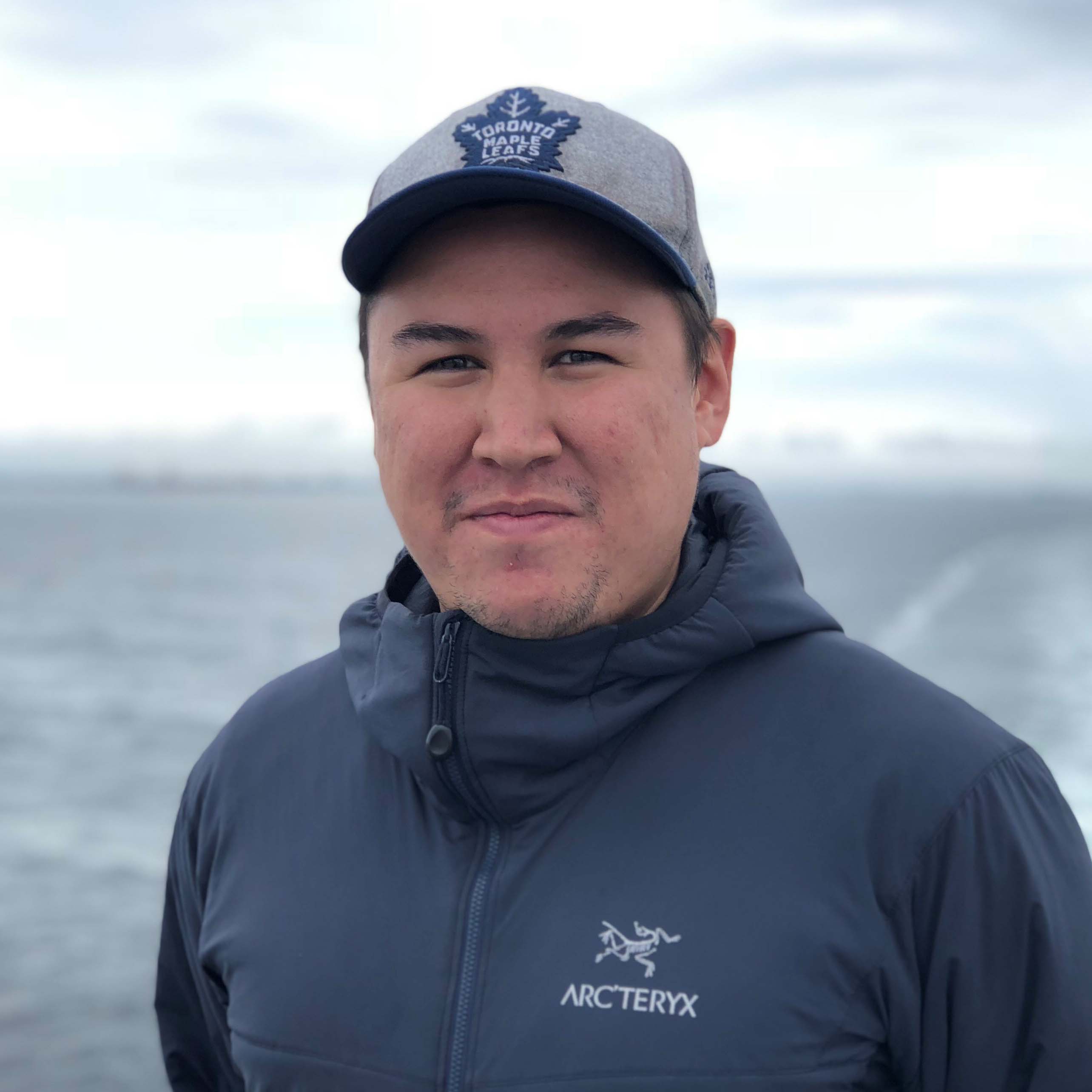
Joshua Stribbell
Inuit
Program Coordinator
Tungasuvvingat Inuit
Joshua Stribbell was born and raised in Keswick, Ontario. His family is from Iqaluit, Nunavut. He has served as President of the National Urban Inuit Youth Council, on the Board of Directors for the Toronto Inuit Association, and as the Youth Program Worker for a grassroots initiative called Torontomiutaujugut. He is currently working as a National Program Coordinator at Tungasuvvingat Inuit, and is a freelance writer in his spare time.
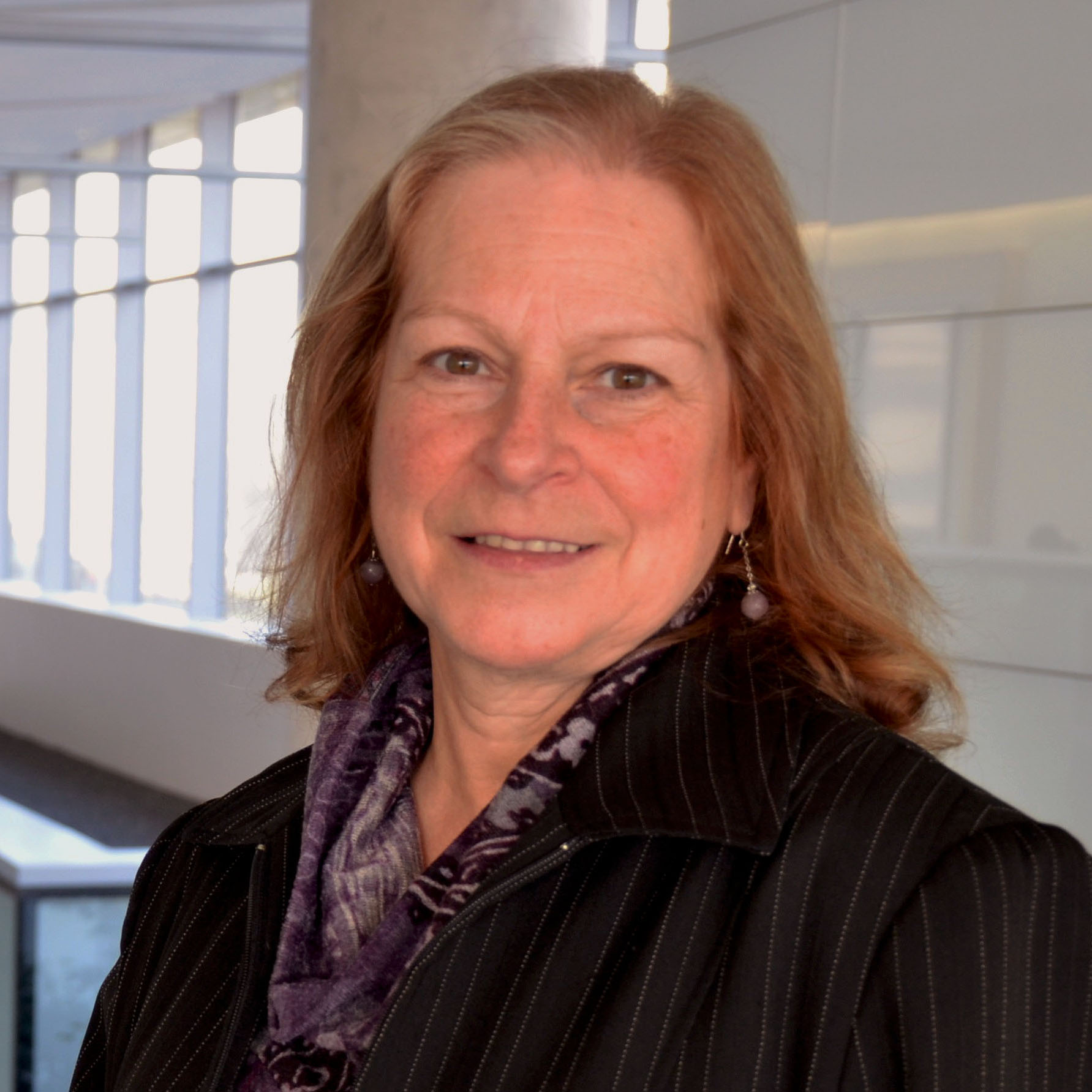
Liette Vasseur PhD
President
Canadian Commission for UNESCO
Professor
Department of Biological Sciences
Brock University
Dr. Vasseur is a full professor in the Department of Biological Sciences at Brock University where she is also a member of the Environmental Sustainability Research Centre. Since 2014, she holds the UNESCO Chair on Community Sustainability: From Local to Global at Brock. Her research program is highly interdisciplinary and links issues such as community-based ecosystem management, climate change adaptation and resilience, and sustainable agriculture, linking issues of human and ecosystem health. She works in China, where she is a visiting scholar at Fujian Agriculture and Forestry University. Her work in Ecuador focuses on the community sustainability and ecosystem-based adaptation to climate change of rural indigenous communities in the Andean region of the Chimborazo. In Canada, in addition of her research program in sustainable agriculture, climate change, and ecosystem management, she has been working with various groups on environmental stewardship, especially regarding conservation. She is also involved in women in STEM in her program and as the current past president of the Canadian Coalition for Women in Engineering, Science, Trades and Technology. She is President of the Canadian Commission for UNESCO (CCUNESCO). She also is the vice-chair for North American Region of the Commission for Ecosystem Management at the International Union for Conservation of Nature and leads the thematic group on Ecosystem Governance.
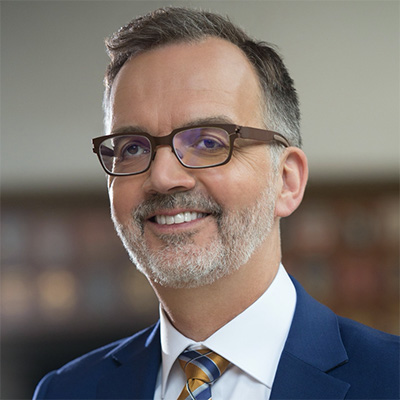
Trevor Young MD PhD FRCPC FCAHS
Dean, Temerty Faculty of Medicine and Vice Provost,
Relations with Health Care Institutions
University of Toronto
Professor Trevor Young is Dean of the University of Toronto’s Faculty of Medicine and Vice Provost, Relations with Health Care Institutions.
Prof. Young graduated from the medical school at the University of Manitoba in 1983. He completed his postgraduate training in psychiatry in 1987, and then his PhD at the Institute of Medical Science, University of Toronto in 1995 and was a research fellow at Johns Hopkins School of Medicine. He has been Professor of Psychiatry and Behavioural Neurosciences at McMaster University; Professor and Head, Department of Psychiatry at the University of British Columbia; and Professor and Chair of the Department of Psychiatry at the University of Toronto. He was also Physician-in-Chief, Executive Vice President Programs at the Centre for Addiction and Mental Health in Toronto.
Prof. Young is a clinician-scientist who studies the molecular basis of bipolar disorder and its treatment. He has published more than 200 peer-reviewed journal articles and has held more than 35 peer-reviewed grants. Prof. Young and his lab focused on the processes that lead to long-term changes in brain structure and function in patients with bipolar disorder, and how mood-stabilizing drugs can alter those changes. Prof. Young has supervised more than 30 research and clinical trainees.
Prof. Young has received many awards including the 2015 Colvin Prize for Outstanding Achievement in Mood Disorders Research from the Brain and Behaviour Research Foundation, the Douglas Utting Award for outstanding contributions in the field of mood disorders, and the Canadian College of Neuropsychopharmacology Heinz Lehmann Award. He has led several large clinical programs including the Mood Disorders Program at Hamilton Psychiatric Hospital, which received the American Psychiatric Services Gold Achievement Award. In 2009, he was made a Fellow of the Canadian Academy of Health Sciences.
Since January 1, 2015, Prof. Young has been Dean of Canada’s largest Faculty of Medicine, with more than 9,600 faculty and staff members, as well as 7,750 students enrolled in undergraduate medicine, postgraduate medicine, radiation sciences, and professional and doctoral graduate programs. As Vice Provost, he is responsible for the University’s partnership with nine fully affiliated hospitals and 20 community-affiliated hospitals and health facilities. The Faculty of Medicine and the fully affiliated hospitals are also a thriving research enterprise — one of the largest in North America — and has attracted $821 million in research funding (2018-19). In 2019, the National Taiwan University Ranking placed U of T Medicine first in Canada and third in the world in medicine.
Youth Panelists
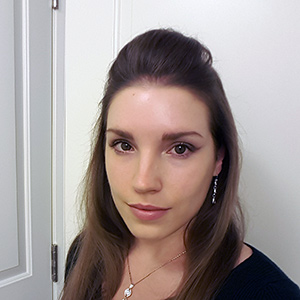
Allyson Dill MD
Mi’kmaq
Family Medicine Resident
Bruyère Family Medicine Centre
University of Ottawa
Allyson Dill is from Mi’kmaq descent and hails from Nova Scotia. Allyson completed her medical degree at the Northern Ontario School of Medicine in 2018 and spent her first year of residency in Anatomical Pathology at McGill University. Allyson is currently in her final year of the Family Medicine program at the University of Ottawa. She has a strong interest in psychotherapy and hopes to use these skills to give back to the indigenous communities of Ontario upon graduating in May 2021.
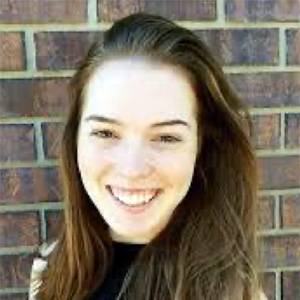
Jordyn Playne
Métis
Jordyn Playne was acclaimed as the PCMNO Youth Representative Most recently, Jordyn served as the Region 7 Youth Representative on the Métis Nation of Ontario Youth Council from 2016-2020. She is a social worker and mental health advocate who received her Masters of Social Work in the Indigenous Field of Studies program from Wilfrid Laurier University in 2019. Jordyn, who currently resides in Penetanguishene, is a descendent of Dusome-Clermont Métis family line from Drummond Island.
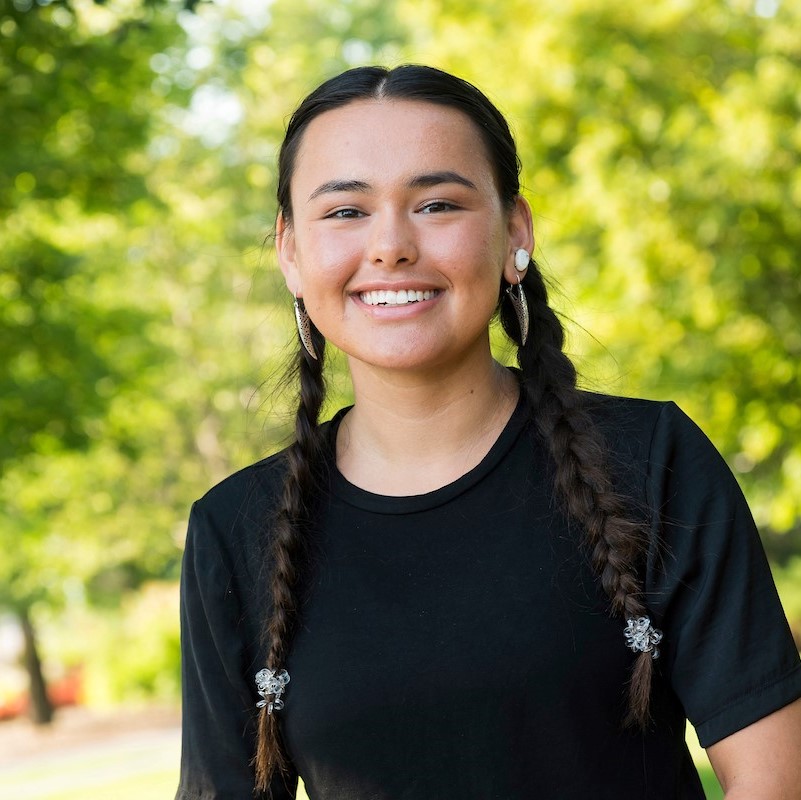
Sila Rogan
Inuit
Sila Rogan is an Inuk born in Iqaluit and raised for a time in Winnipeg. She is currently studying genetics and physiology as a Loran Scholar at the University of British Columbia and works as a research assistant in First Nations engagement at UBC’s Centre for Rural Health Research. Outside of school, Sila is a passionate advocate for youth engagement and Indigenous health and serves as a council member on the Prime Minister’s Youth Council and a board member at large for the Canadian Society for Circumpolar Health. Sila is interested in the intersections between health, Indigenous knowledge, scientific innovation, and the environment.
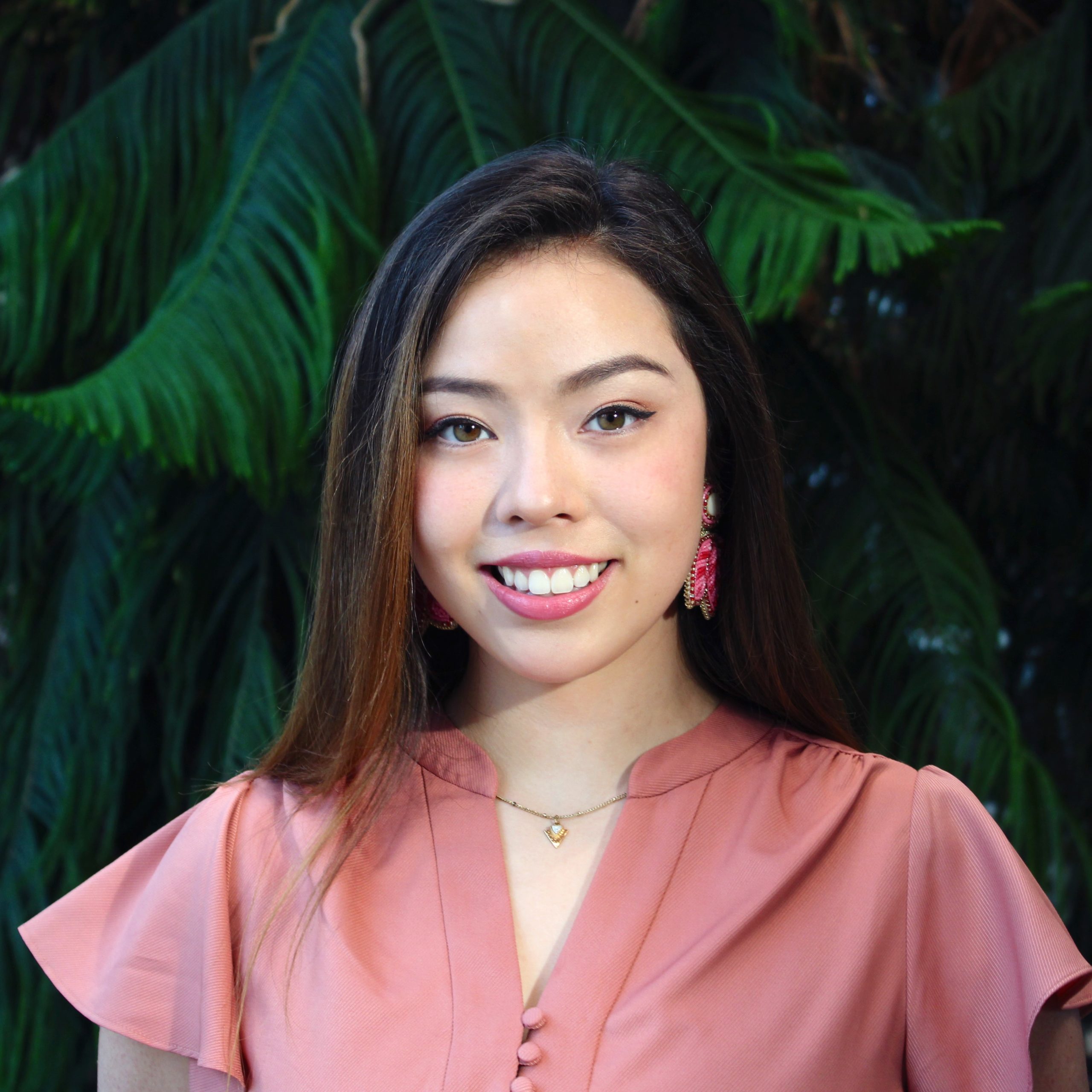
Semiah Smith
Mohawk Nation, Turtle Clan, Six Nations Grand River Territory
Semiah Kaha:wi Smith is a multi-disciplinary artist and student from the Kahnyen’kehàka (Mohawk) Nation, Turtle Clan, Six Nations of the Grand River. Currently, at 21 years of age, Semiah is in the Bachelor of Health Sciences Program at McMaster University. She has interned at the Roswell Park Cancer Comprehensive Center where she assisted in the creation of the film, “Translating the Interplay: Indigenous Knowledge and Modern Medicine” under the guidance of Dr. Rodney Haring as well as worked in a clinical research setting under urologic surgeon, Dr. Kurhsid Guru. This past summer she was chosen to participate in the Four Directions Summer Research Program offered by Harvard Medical School. She worked in Dr. Matt Warman’s orthopedic research lab where she genotyped zebrafish for the WISP3 gene. Semiah is also an artist, singer, and songwriter of Indigenous and contemporary songs. Her most noted performances include: dancing in the North American Indigenous Games Opening Ceremonies led by Santee Smith, singing in the Illuminato Festival under Cris Derksen, and performing in The Mushole produced by Kaha:wi Dance Theatre. Semiah looks to find a future where her love for the arts, and science can intersect as well as stem from and benefit her Indigenous heritage.
Elders’ Panel
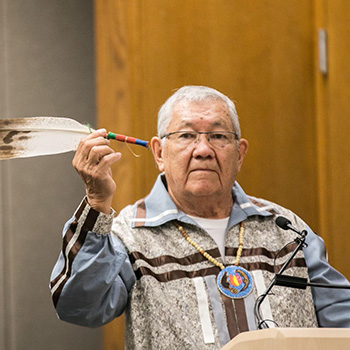
Barney Batise
Matachewan First Nation
Barney Batise is a respected Nishnawbe Aski Nation Elder and former Chief of Matachewan First Nation who brings a vast amount of knowledge and wisdom to the Implementation Committee, as well as an eagerness to identify ways to make meaningful change to the justice system.
Beginning his career in the service of First Nations as an Executive Director of the North Bay Indian Friendship Centre in 1974, Mr. Batise went on to become president of the Ontario Federation of Indian Friendship Centres and later, the National Association of Friendship Centres. In 1988, Mr. Batise was elected Chief of Matachewan First Nation, a role he held for three consecutive terms. During this time, he was heavily involved in the development of Kunuwanimano Child and Family Services and had a leading role in the foundation of the Wabun Tribal Council.
Retiring in 2000, Mr. Batise continues to work to improve conditions for First Nation people by developing governance models for First Nations, acting as an Elder Advisor for the Nishnawbe Aski Police Service, and supporting Health Canada and Chiefs of Ontario in the development of e-Health models in support of First Nation needs.
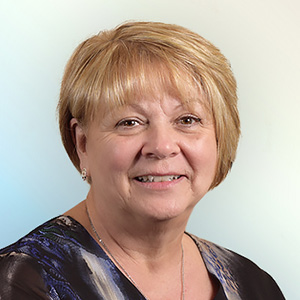
Verna Porter Brunelle
Métis Senator
I live in beautiful Huntsville Muskoka with my husband. We have a blended family of 5 children and 5 grandchildren. We all love camping and with Covid 19 we have done lots of camping within our “family bubble” this summer.
I have served 8 years on the Provisional Council of the Metis Nation of Ontario (MNO) as 1 of 4 Senators. I have been involved with the MNO since 1994, sitting on the Moon River Métis Council, helping with fund raisers, attending annual general meetings and speaking at schools, universities and church organizations.
I also sit on the Nuclear Waste Management Organization’s Council of Elders and Youth and on the Elders Council for Ontario’s Indigenous Justice Program. I truly enjoy the comradery and the voices we are able to share on these two Councils.
I look forward to this conference and hope to learn and share visons and experience with our youth.
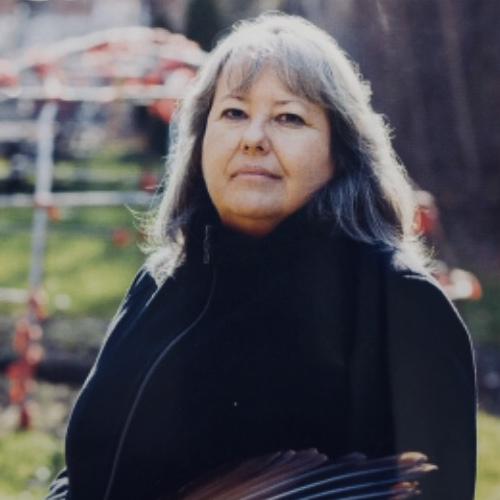
Kahontakwas Diane Longboat BA MEd
Mohawk Nation, Turtle Clan, Six Nations Grand River Territory
Senior Project Manager, Guiding Directions Implementation
Centre for Addiction and Mental Health
Traditional Healer
Soul of the Mother
Kahontakwas Diane Longboat, BA, BEd, MEd is a member of the Turtle Clan and Mohawk Nation at Six Nations Grand River Territory, Canada. She is a ceremonial leader, traditional teacher and healer. She has served as Elder for the Centre for Addiction and Mental Health since January of 2013, and is the Senior Project Manager for the implementation of Guiding Directions, the CAMH strategy to improve practices and partnerships for First Nations, Inuit and Métis peoples.Diane lead the development of Ceremony Grounds at CAMH including a Sweat Lodge, medicine gardens, a Sacred Fire and the policies authorizing traditiona healing.
Ms Longboat is founder of Soul of the Mother, a Healing Lodge on the shores of the Grand River at Six Nations Grand River Territory, with extensive relationships with First Nations in Canada and the United States. She is also founder of First Nations House (Office of Aboriginal Student Services and Programs) at the University of Toronto
In 2017 and 2018, Ms Longboat was the Indigenous Education Advisor to the Premier of Ontario, Kathleen Wynne, and the Ontario Ministry of Education. She was also Co-Chair of the Indigenous Working Group for the development of the Indigenous Peoples Program at the Parliament of the World’s Religions global gathering in Toronto in November 2018. Over 100 Indigenous spiritual leaders spoke in the Lodge of Nations built inside the Metro Toronto Convention Centre.
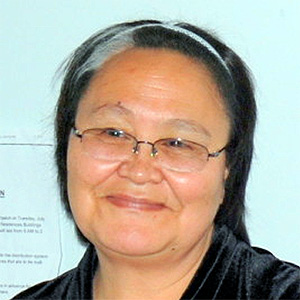
Meeka Kakudluk MEd
Inuit
Meeka Kakudluk was born in Padloping Island. She is a retired teacher (37 years of service) based in Ottawa Ontario.
Meeka Graduated from the Teacher Education Program in Fort Smith N.W.T. in 1976. She has taught grades K-3 in Pangnirtung, Qikiqtarjuaq and Iqaluit. She has also served as vice-principal at Joamie School.
Meeka is a graduate of McGill University and is one of the first Inuit to graduate from a Masters program (UPEI) in 2009 with Elisapee Karetak.
